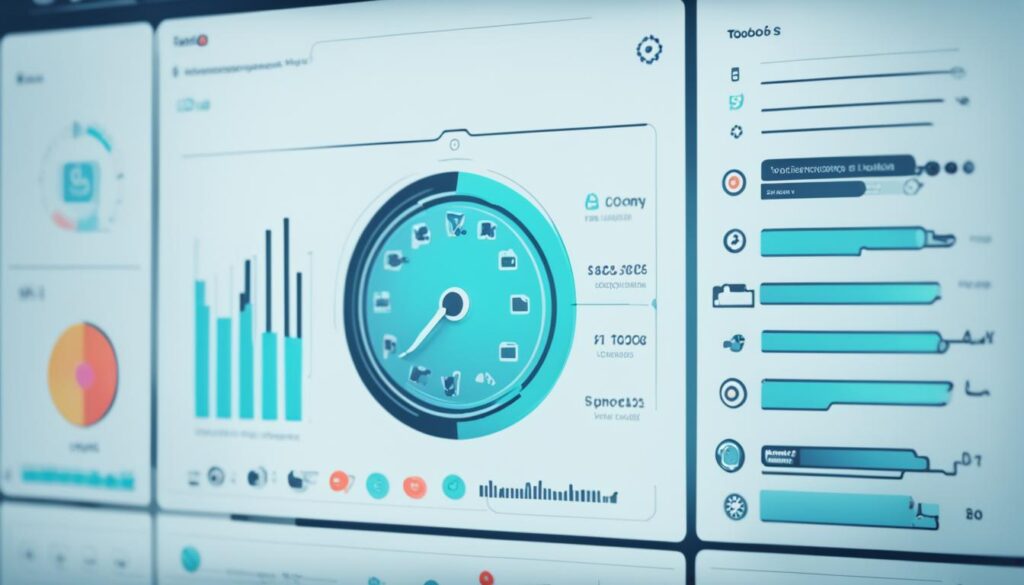“In God we trust. All others must bring data.” These wise words from W. Edwards Deming are perfect for today’s world. In digital marketing, using AI-driven tools has completely changed our strategies and actions.
We’ve embraced digital marketing AI tools fully. This has revolutionized our strategies and kept us ahead of others in the B2B sector. Thanks to these technological advances, we’ve found new ways to make campaigns better and handle everyday tasks automatically. It’s important since 73 percent of marketers now use AI for work, says Statista. Plus, companies that customize their marketing with AI see a 40 percent boost in revenue over the competition.
Exploring the AI world has given us essential tools. These tools keep us up-to-date and maximize AI’s benefits for marketing. This journey isn’t just about using new tech. It’s about mastering it to make campaigns that really connect with people.
Key Takeaways
- 73% of marketers use generative AI tools for their campaigns.
- AI-driven marketing technology boosts revenue by 40% through personalization.
- Integrating digital marketing AI tools helps automate and optimize repetitive tasks.
- Data-driven strategies are essential for staying competitive in the B2B landscape.
- Effective use of AI tools ensures efficiency and relevance in marketing efforts.
Introduction to AI Marketing Tools and Their Benefits
AI marketing tools are changing the way we handle marketing strategy. They make use of artificial intelligence to tackle complex tasks like analyzing data from the past and predicting future trends. These tools not only make our work simpler but also greatly boost our business productivity.
https://www.youtube.com/watch?v=uRnd_1R-xzY
Automated marketing platforms can deal with huge data quickly and with precision. Take Sprout Social, for example. It processes over 50,000 messages every second for Listening and 600 million messages daily. This fast data handling is crucial for staying ahead with timely social media data analysis.
A whopping 97% of business leaders believe AI and machine learning are key for better social media data analysis. Additionally, 44% use sentiment analysis to understand consumer behavior, and 41% use natural language processing (NLP) to better customer service. These tools help us create marketing that truly connects with people.
- Jasper: Provides content generation templates in over 25 languages and has garnered over 5,000 5-star product reviews.
- Surfer SEO: Compares search term SERPs to top-ranking pages, assisting in content strategy.
- Originality AI: Ensures content authenticity by detecting AI-written text and verifying its originality.
- Writer.com: Offers team-based features like autocorrect, autocomplete, and clarity checks.
- Content at Scale: Known for creating high-quality content suitable for AI detectors.
Another great tool, Notion AI, helps automate tasks at a low cost per member. Platforms like Keyword Insights make AI writing and human collaboration easier. This partnership greatly strengthens our marketing, making it more flexible and responsive.
AI marketing software and intelligence platforms are leading a major change. Looking into 2024, these technologies play a big role in gathering and analyzing data on competitors, market trends, and customer opinions. They equip us to reach outstanding marketing results and stay competitive in a constantly changing environment.
The AI Landscape: Current Trends and Statistics
The world is quickly moving to mix AI into various fields. We see this change clearly in marketing. Here, new AI tools for marketing are reshaping how we reach audiences.
Let’s look closer at the trends and numbers showing this shift.
Increased Adoption Across Industries
Many sectors are now using AI, and marketing benefits a lot. About 64.5% of marketers have tried at least one AI tool. This shows they trust and rely more on this technology.
Also, 88% of marketers think AI and automation are key to stay ahead. These facts show there’s a big move towards understanding how AI can change business.
Impact on Customer Experience and Retention
AI is making a big difference in how we keep customers happy and loyal. Cognitive tools in marketing help make each customer’s experience unique. This has become very important in today’s marketing plans.
AI analyzes data fast, helping understand markets and customer needs better. This leads to more personal and engaging customer experiences. It strengthens loyalty. A study found 71.2% of marketers believe AI will do better than humans in marketing efforts.
AI’s Contributions to Marketing Efficiency
AI is making marketing work easier and more efficient. It lets marketers automate tasks that used to take a lot of time. AI tools can sift through huge data sets quickly, spotting trends and predicting what customers will do next.
This helps in making marketing plans better, giving a stronger return on investments. AI is also speeding up writing tasks, like making emails or product descriptions. Even with challenges like setting it up and keeping data private, AI’s benefits make it a key part of marketing’s future.
How AI Marketing Tools Enhance Content Creation
AI marketing tools have changed how we create content. They make it faster and better. Marketers can now make high-quality text, audio, and video quickly. This ensures a brand’s message stays strong and interesting.

AI Tools for Text Content
Text is key in marketing. AI tools like Keyword Insights, Jasper, and Writer help a lot. They help in research, writing, and making content better.
- Keyword Insights: This tool offers an advanced AI writing assistant that incorporates functionality for content research, writing, and optimization, making it an essential part of modern content creation.
- Jasper: With over 11,000 fonts, 2,500 categories, and 25 languages, Jasper uses generative AI to speed up the writing process, making it easier to create diverse and engaging text content.
- Writer: This tool helps maintain a consistent tone of voice by offering grammar and clarity suggestions, facilitating content collaboration across marketing teams.
AI Tools for Audio Content
More people are listening to podcasts and using voice search now. AI can make creating audio faster and better.
- Eleven Labs: Offers advanced text-to-audio conversion, allowing for seamless and professional voiceovers.
- Murf AI: Provides a comprehensive suite for voice recording and editing, making it easier to create polished audio content.
- Beatoven: Facilitates the creation of royalty-free music, ensuring that your audio content is both unique and legally compliant.
AI Tools for Video Content
Video is important in digital marketing today. AI can do everything from editing to making personalized videos.
- Krisp AI: Ideal for removing background noise from video recordings, enhancing audio quality.
- Ssemble: Offers a wide range of video editing capabilities, from trimming to adding special effects.
- Opus Video: Tailored for creating personalized videos, especially useful for social media and individual targeting.
- HeyGen: Specializes in generating personalized video content, making it easy to engage with your audience on a deeper level.
Top AI Marketing Tools for Social Media Management

Exploring social media management shows AI’s critical role. These digital marketing AI tools elevate brand presence on various platforms. They manage social mentions well and suggest content and captions, making marketing easier.
Managing Social Mentions
Sprout Social uses AI to monitor over 50,000 messages per second. This keeps brands updated on their social mentions. AI tools analyze feelings in product reviews and customer feedback. FeedHive and Vista Social have plans from $19 and $15 a month, fitting any budget.
Content Suggestions and Captions
AI improves content suggestions and caption writing. Buffer tailors posts for each social media platform, with plans starting at $6/month/channel. ContentStudio, from $25/month, offers insights on trending content to keep audiences hooked. Ocoya and Predis.ai help create engaging captions and videos starting at $19/month and $29/month, respectively.
AI tools in social media management boost both efficiency and strategy. Investing in these digital marketing AI tools speeds up decisions and gives a competitive advantage.
| Tool | Starting Price | Special Features |
|---|---|---|
| FeedHive | $19/month | AI Writing Assistant |
| Vista Social | $15/month | Connect multiple channels |
| Buffer | $6/month/channel | Tailor posts to each channel |
| ContentStudio | $25/month | Trending content insights |
| Ocoya | $19/month | AI copywriter for captions |
| Predis.ai | $29/month | Video generation |
Leveraging AI SEO Tools for Improved Visibility
AI SEO tools are changing the game by enhancing content and technical insight. MarketMuse, BrightEdge, and Surfer SEO are leading the charge. They let us use AI to boost our strategy for getting noticed.

Content Optimization
Improving search rankings is crucial, and AI tools push this further. Using MarketMuse and Frase, we get detailed content guides and tips for betterment. This means content that matches what readers want and follows new search patterns. It helps keep readers on the page and more engaged.
Technical SEO Insights
AI is also improving technical SEO insights. Tools like DeepCrawl and BrightEdge give essential data to fix website issues. They automate keyword finding and offer insights about competitors. AI’s precision saves us time, letting us get creative and strategic to boost visibility and clicks.
Using AI for Data Analysis and Campaign Optimization
In 2023, AI has reshaped how we analyze data and refine marketing moves. It lets businesses dive deep into customer habits. With this tech, they can also foresee marketing trends.
Firms are now banking more on AI tools like PaveAI, RapidMiner, and MonkeyLearn. These tools dig into marketing data for valuable insights. This helps predict market changes and craft effective strategies. A McKinsey & Co. survey shows customers want brands to get their needs right, adding weight to personalized marketing.
Customer Behavior Insights
AI tools are key to unlocking customer behavior secrets. They sift through loads of data to find trends. For example, Sprout Social uses analysis tools to gauge consumer feelings and market shifts. Marketers can then fine-tune campaigns with up-to-date data.
Predictive Analytics
Predictive tools help forecast future market movements. They look at past data to guess future customer actions. Tools like RapidMiner aid in shaping marketing plans with foresight. This keeps marketing strategies ahead, adapting to customer changes swiftly.
AI in data analysis and marketing fine-tunes efficiency and gives a competitive edge. With AI and predictive tools, understanding and meeting customer needs becomes easier.
ai marketing tools
AI marketing tools have changed the way we do marketing. They offer strong solutions. This includes multi-functional toolkits to no-cost tools with great results.
Comprehensive Toolkits
The range of AI marketing tools is wide, with platforms offering many functions. Promptly and Flowise are key examples. They handle tasks and create AI agents. These platforms also do sentiment analysis and understand human language.
97% of leaders think AI will improve social media analysis, says the 2023 State of Social Media Report. Sprout Social can process over 50,000 messages every second. It analyzes more than 600 million messages each day. This shows the effectiveness of AI tools in marketing.
Free AI Marketing Tools
For budget-friendly marketing, free AI tools are very helpful. Google Analytics, HubSpot CRM, and Mailchimp are important. Google Analytics helps improve websites by understanding user actions. HubSpot CRM manages customer relationships well. Mailchimp is good for email campaign analysis and automation.
- Google Analytics: Provides deep insights into website use.
- HubSpot CRM: Manages customer relations thoroughly.
- Mailchimp: Analyzes and automates email campaigns.
Free AI tools make advanced marketing available to all. They help small businesses compete well without big spending. Together, AI tools help marketers work smarter, enhance content, and get valuable insights. This leads to better and more efficient marketing strategies.
| Tool | Key Features | Cost |
|---|---|---|
| Sprout Social | Sentiment Analysis, NLP, Social Media Data Processing | Varies by plan |
| Google Analytics | Website Performance Insights, User Behavior Tracking | Free |
| HubSpot CRM | Customer Relationship Management, Lead Interaction | Free |
| Mailchimp | Email Campaign Analysis, Automation | Free |
Using both types of AI tools, comprehensive and free, boosts our work. It leads to innovative and cost-effective marketing campaigns.
Building Effective AI-Driven Agents, Chatbots, and Workflows
Artificial intelligence is changing marketing in big ways. The growth of AI agents, chatbots, and workflows makes campaign tasks easier and improves how we talk to customers. This new tech is key for businesses to keep up in 2023 and the future.
Automating Campaign Tasks
At the core of this tech is automation. With tools like Promptly and Flowise, businesses save time on complex tasks. These AI agents make it easy to work together and understand data, leading to better marketing. Companies are using these tools more to improve customer support, offer personalized deals, and analyze data better. This boosts their marketing a lot.
Creating Generative AI Agents
Developing generative AI agents marks big progress. Using advanced models like GPT-3 and GPT-4, these agents customize campaigns for each client. They use natural language processing (NLP) for better customer service and unique experiences. Also, tools like Sprout Social analyze feelings in messages, processing millions a day. This improves how audiences feel and how satisfied they are.
Adding AI agents to marketing workflows leads to faster, more focused strategies and understanding of customer behavior. A McKinsey & Co survey shows customers now expect brands to know them well. AI tools like Surfer SEO and Grammarly ensure messages are clear, powerful, and connect with people correctly.
Also, the global chatbot market might reach USD 27.3 billion by 2030. Chatbots can sort out up to 80% of usual questions by themselves. Chatbots available 24/7 help make customers happier and more loyal. These high-level AI platforms improve results and give valuable insights to increase returns. Adopting AI agents, chatbots, and workflows is essential for innovative marketing.
Here is a comparative overview of some pivotal tools:
| Tool | Focus Area | Key Benefits |
|---|---|---|
| Promptly | Task automation, campaign coordination | Seamless task management, data synthesis |
| Flowise | Workflow automation | Enhanced efficiency, agile strategies |
| Sprout Social | Sentiment analysis, message processing | Improved audience engagement, 24/7 customer service |
| Surfer SEO | On-page optimization | Enhanced search rankings, content recommendations |
| Grammarly | Content accuracy | Error-free content, engagement suggestions |
Utilizing AI in the Hospitality Industry
In the hospitality world, AI is changing the game. It makes guest experiences better and operations smoother. At Hilton Hotels & Resorts, Connie, an AI concierge, helps guests with info about the hotel, where to eat, and places to see. The Cosmopolitan in Las Vegas has Rose, an AI chatbot, to help guests book restaurants and find city tips. AI tools like these are changing how guests interact with hotels.
AI does more than help guests. It also improves how hotels work. Marriott International uses AI to let guests control room settings with their voices. They also use AI to plan housekeeping based on when guests arrive and leave. This not only makes guests happier but also saves hotels money. Edwardian Hotels have an AI chatbot named Edward. He quickly answers guest questions about their rooms or if they need more pillows. This makes sure guests get fast, personal help.
AI also helps hotels understand the market and what customers want. AccorHotels uses AI to remember guest preferences and tailor offers. TrustYou uses AI to look at online reviews and find ways to get better. While AI is bringing new chances to hotels, it’s important for them to use it right. They need to keep services personal and watch out for high costs. With careful use, AI can help hotels offer amazing experiences and run more smoothly.



